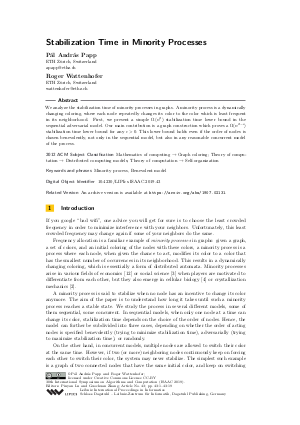Stabilization Time in Minority Processes
Authors Pál András Papp, Roger Wattenhofer
-
Part of:
Volume:
30th International Symposium on Algorithms and Computation (ISAAC 2019)
Part of: Series: Leibniz International Proceedings in Informatics (LIPIcs)
Part of: Conference: International Symposium on Algorithms and Computation (ISAAC) - License:
 Creative Commons Attribution 3.0 Unported license
Creative Commons Attribution 3.0 Unported license
- Publication Date: 2019-11-28
File

PDF
LIPIcs.ISAAC.2019.43.pdf
- Filesize: 0.53 MB
- 19 pages
Document Identifiers
Related Versions
-
An archive version is available at https://arxiv.org/abs/1907.02131.
Subject Classification
ACM Subject Classification
- Mathematics of computing → Graph coloring
- Theory of computation → Distributed computing models
- Theory of computation → Self-organization
Keywords
- Minority process
- Benevolent model
Metrics
- Access Statistics
-
Total Accesses (updated on a weekly basis)
0Document
0Metadata
Abstract
We analyze the stabilization time of minority processes in graphs. A minority process is a dynamically changing coloring, where each node repeatedly changes its color to the color which is least frequent in its neighborhood. First, we present a simple Omega(n^2) stabilization time lower bound in the sequential adversarial model. Our main contribution is a graph construction which proves a Omega(n^(2-epsilon)) stabilization time lower bound for any epsilon>0. This lower bound holds even if the order of nodes is chosen benevolently, not only in the sequential model, but also in any reasonable concurrent model of the process.
Cite As Get BibTex
Pál András Papp and Roger Wattenhofer. Stabilization Time in Minority Processes. In 30th International Symposium on Algorithms and Computation (ISAAC 2019). Leibniz International Proceedings in Informatics (LIPIcs), Volume 149, pp. 43:1-43:19, Schloss Dagstuhl – Leibniz-Zentrum für Informatik (2019)
https://doi.org/10.4230/LIPIcs.ISAAC.2019.43
BibTex
@InProceedings{papp_et_al:LIPIcs.ISAAC.2019.43,
author = {Papp, P\'{a}l Andr\'{a}s and Wattenhofer, Roger},
title = {{Stabilization Time in Minority Processes}},
booktitle = {30th International Symposium on Algorithms and Computation (ISAAC 2019)},
pages = {43:1--43:19},
series = {Leibniz International Proceedings in Informatics (LIPIcs)},
ISBN = {978-3-95977-130-6},
ISSN = {1868-8969},
year = {2019},
volume = {149},
editor = {Lu, Pinyan and Zhang, Guochuan},
publisher = {Schloss Dagstuhl -- Leibniz-Zentrum f{\"u}r Informatik},
address = {Dagstuhl, Germany},
URL = {https://drops.dagstuhl.de/entities/document/10.4230/LIPIcs.ISAAC.2019.43},
URN = {urn:nbn:de:0030-drops-115393},
doi = {10.4230/LIPIcs.ISAAC.2019.43},
annote = {Keywords: Minority process, Benevolent model}
}
Author Details
References
-
Cristina Bazgan, Zsolt Tuza, and Daniel Vanderpooten. Satisfactory graph partition, variants, and generalizations. European Journal of Operational Research, 206(2):271-280, 2010.

-
Olivier Bodini, Thomas Fernique, and Damien Regnault. Crystallization by stochastic flips. In Journal of Physics: Conference Series, volume 226, page 012022. IOP Publishing, 2010.

-
Zhigang Cao and Xiaoguang Yang. The fashion game: Network extension of matching pennies. Theoretical Computer Science, 540:169-181, 2014.

-
Jacques Demongeot, Julio Aracena, Florence Thuderoz, Thierry-Pascal Baum, and Olivier Cohen. Genetic regulation networks: circuits, regulons and attractors. Comptes Rendus Biologies, 326(2):171-188, 2003.

-
Silvio Frischknecht, Barbara Keller, and Roger Wattenhofer. Convergence in (social) influence networks. In International Symposium on Distributed Computing, pages 433-446. Springer, 2013.

-
Bernd Gärtner and Ahad N Zehmakan. Color war: Cellular automata with majority-rule. In International Conference on Language and Automata Theory and Applications, pages 393-404. Springer, 2017.

-
Bernd Gärtner and Ahad N Zehmakan. Majority model on random regular graphs. In Latin American Symposium on Theoretical Informatics, pages 572-583. Springer, 2018.

-
Eric Goles and Jorge Olivos. Periodic behaviour of generalized threshold functions. Discrete Mathematics, 30(2):187-189, 1980.

-
Sandra M Hedetniemi, Stephen T Hedetniemi, KE Kennedy, and Alice A Mcrae. Self-stabilizing algorithms for unfriendly partitions into two disjoint dominating sets. Parallel Processing Letters, 23(01):1350001, 2013.

-
Dominik Kaaser, Frederik Mallmann-Trenn, and Emanuele Natale. Brief Announcement: On the Voting Time of the Deterministic Majority Process. Distributed, page 647, 2015.

-
Barbara Keller, David Peleg, and Roger Wattenhofer. How Even Tiny Influence Can Have a Big Impact! In International Conference on Fun with Algorithms, pages 252-263. Springer, 2014.

-
Jeremy Kun, Brian Powers, and Lev Reyzin. Anti-coordination games and stable graph colorings. In International Symposium on Algorithmic Game Theory, pages 122-133. Springer, 2013.

-
Pál András Papp and Roger Wattenhofer. Stabilization Time in Weighted Minority Processes. In 36th International Symposium on Theoretical Aspects of Computer Science (STACS 2019). Schloss Dagstuhl-Leibniz-Zentrum fuer Informatik, 2019.

-
Damien Regnault, Nicolas Schabanel, and Éric Thierry. Progresses in the Analysis of Stochastic 2D Cellular Automata: A Study of Asynchronous 2D Minority. In Luděk Kučera and Antonín Kučera, editors, Mathematical Foundations of Computer Science 2007, pages 320-332. Springer Berlin Heidelberg, 2007.

-
Damien Regnault, Nicolas Schabanel, and Éric Thierry. On the analysis of “simple” 2d stochastic cellular automata. In International Conference on Language and Automata Theory and Applications, pages 452-463. Springer, 2008.

-
Jean-Baptiste Rouquier, Damien Regnault, and Éric Thierry. Stochastic minority on graphs. Theoretical Computer Science, 412(30):3947-3963, 2011.

-
Saharon Shelah and Eric C Milner. Graphs with no unfriendly partitions. A tribute to Paul Erdös, pages 373-384, 1990.

